
Tell us what you need to find a matching loft conversion specialist

Get free quotes from professionals near you

Compare offers and choose the one that best matches your need
- Householdquotes.co.uk
- Driveway
- Driveway Materials
- Concrete Driveway
- Imprinted Concrete Driveway
Imprinted Concrete Driveway: Everything You Need To Know

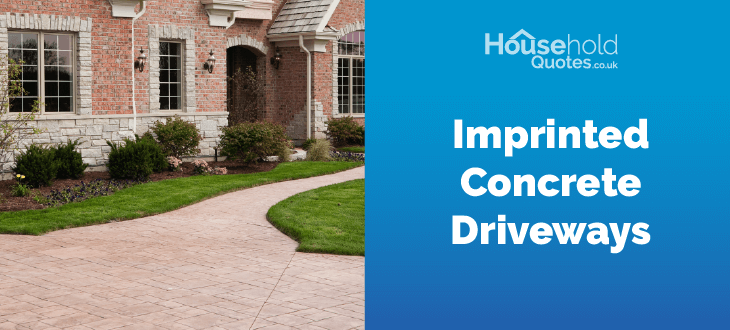
- The average cost of an imprinted concrete driveway is around £80 per m2. The price is affected by the driveway's size and shape, the concrete's quality, and the design's complexity.
- A stamped concrete driveway can last 20 to 30 years with proper maintenance.
- Imprinted patterned concrete can mimic the look of natural stone, timber, brick or slate.
- DIYing an imprinted concrete driveway is not recommended, as installing requires specialised skills. Failure to install correctly can result in cracks, chips and potholes.
- Stamped concrete is easy to maintain and only requires a simple weekly brush to keep it clean.
- Resealing imprinted concrete every 2 to 5 years will protect your driveway from weather damage and stains and ensure its longevity.
Imprinted concrete driveways have become popular in the UK as they are cost-effective, aesthetically pleasing, durable, and versatile.
In contrast to traditional concrete or paving stones, printed concrete driveway combines style and functionality, turning ordinary driveways into attractive focal points of any property.
By mimicking high-end materials such as stone, brick, or wood at a fraction of the cost, imprinted concrete driveways offer an elegant solution without compromising quality or performance.
This article will examine the various advantages of patterned concrete driveways, outline the installation process, and detail the associated costs, providing a comprehensive guide to help you decide if patterned concrete driveways are the right choice for you.
Once you've learned about imprinted concrete driveways and decided they're the best choice, the next crucial step is to secure the best deal from local driveway specialists. This typically involves comparing multiple quotes, which can be time-consuming and frustrating.
Fortunately, Household Quotes can make things easier by providing four free quotes from trusted local driveway specialists. Just take 30 seconds to fill out our form below, and we'll deliver quotes tailored to your needs and budget. Click below to take advantage of this opportunity.
- Describe your needs
- Get free quotes
- Choose the best offer
It only takes 30 seconds

What is imprinted concrete for driveways?
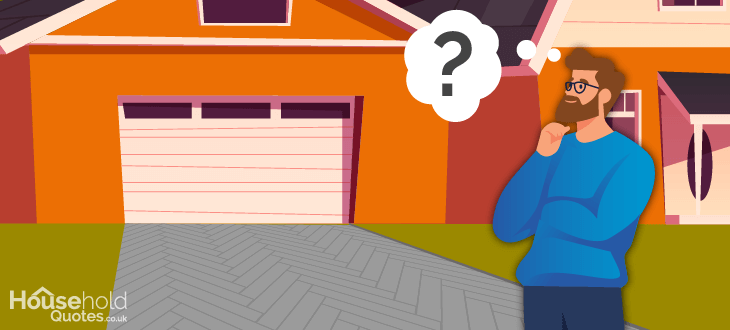
Pattern imprinted concrete is a design technique for creating decorative driveways and patios. The process involves pouring fresh concrete and then imprinting it with moulds or stamps to achieve the desired texture and pattern, resembling natural materials like stone, slate, brick, or wood.
This is one of the best driveway materials available in the UK for those looking for a cost-effective solution for block driveways.
You can colour stamped concrete to achieve a more natural look, adding different patterns. By using natural tones like browns, reds, blues, and greens, you can create a unique and appealing design.
Stamped concrete driveways are versatile and can resemble high-end driveways. They are also made from concrete, one of the strongest building materials available, meaning that, according to the Driveway Company, your driveway will last up to 20 to 30 years.
Imprinted concrete driveways provide an attractive and practical solution for improving the appearance and functionality of any property. Their combination of durability and aesthetic flexibility makes them a compelling alternative to traditional driveway materials, making them a popular choice for those looking for both beauty and practicality in their outdoor spaces.
Imprinted concrete driveway cost per m2
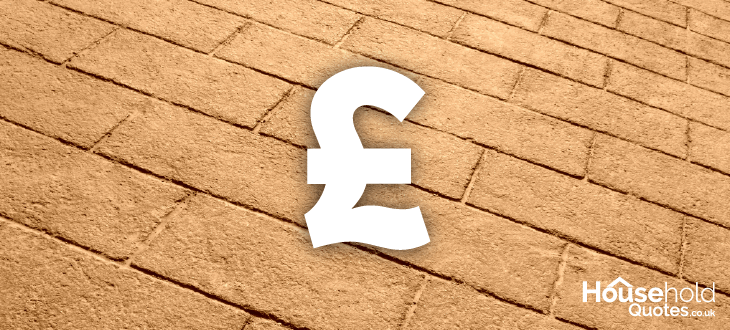
The average cost for an imprinted concrete driveway is £80 per m2, as stated by Checkatrade. However, stamped concrete driveway costs can vary based on factors such as the type of concrete used, the size and shape of the driveway, the complexity of the chosen pattern, and the current condition of the area.
Stamped concrete is pricier than other paving materials like flat-poured concrete, tarmac, or gravel because it takes more time to create its pattern. However, it's an excellent option for those seeking a high-end look with one of the best cheap driveway materials.
Below, we have provided a comparison list of different driveway materials:
| Driveway material | Average cost per m2 |
|---|---|
| Tarmac or asphalt | £75 |
| Flat poured concrete | £21.50 |
| Gravel | £45 |
| Resin | £80 |
| Clay bricks | £82.50 |
| Imprinted concrete | £80 |
The costs provided above are estimates for materials only. The more complex and time-consuming the material installation, the higher the labour costs will be.
If you opt for a more intricate design or have a larger driveway, the specialists will take longer to complete the project. Also, labour costs will increase if you require an old driveway removed.
Driveway installers charge a daily rate between £150 to £200, so the project's duration will affect the overall cost of imprinted concrete driveways.
Grading and quality are other critical factors influencing the cost of imprinted concrete driveways. Concrete is graded from C10 to C40. C10 is the weakest grade and cheapest, but it is only suitable for patios.
Even though it may be tempting to reduce costs by choosing a lower-grade concrete, it will affect the strength of your driveway and result in cracking and sinking, leading to costly future repairs.
The standard grade for all concrete driveways is C30, which is perfect for withstanding and supporting the weight of your vehicles. When you opt for the highest quality, your driveway will have a longer lifespan.
Best imprinted concrete patterns and colours in the UK
Several imprinted concrete patterns are available in the UK that you can choose from, making it a versatile choice for different preferences and aesthetics. Some of the most popular patterns include:
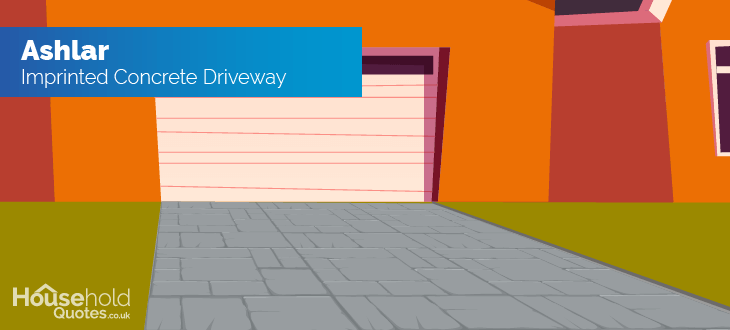
Ashlar stone: This pattern offers a textured stone effect in rectangles and squares, providing a sophisticated look reminiscent of ancient European courtyards.
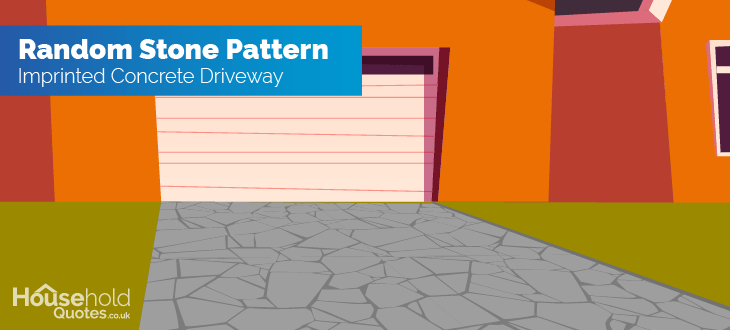
Random stone: This pattern creates an irregular pattern mimicking natural stone slates, giving your entryway a durable and natural feel.
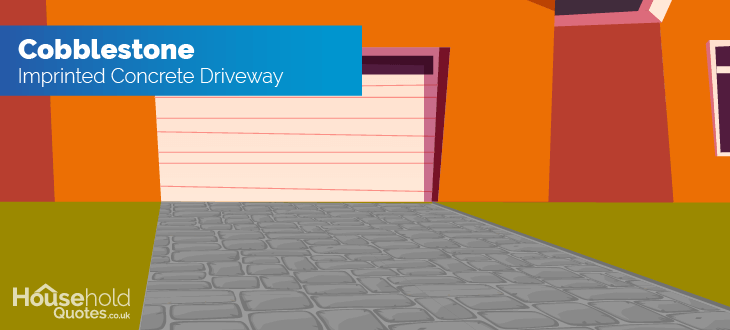
London cobbles: Highly sought after for its classic, timeless appeal, cobblestone complements traditional British architecture.
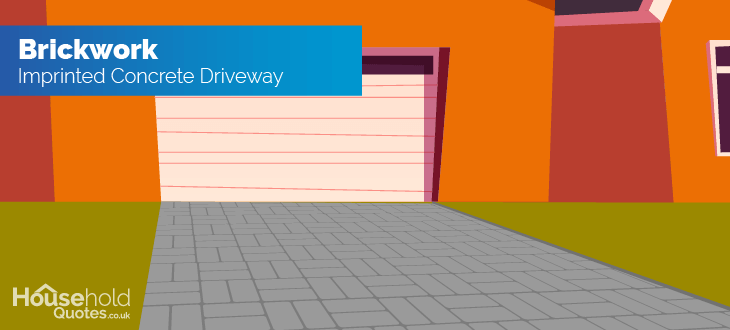
Brickwork: This imprinted concrete driveway imitates brickwork patterns such as stretcher bond or herringbone, offering a practical and cost-effective option for the appearance of high-end driveways.
Decking: Mimicking wooden flooring, the timber plank pattern provides a more rustic charm while offering the resilience of concrete.
When it comes to colours, earthy tones like terracotta and sandstone are popular. They blend seamlessly with the natural landscape and typical UK weather conditions.
Slate grey and charcoal also stand out, providing a sleek, modern appearance that suits contemporary homes. The versatility in patterns and colours allows homeowners to tailor their spaces to reflect personal style while enhancing the property’s curb appeal.
Installing concrete imprint driveways
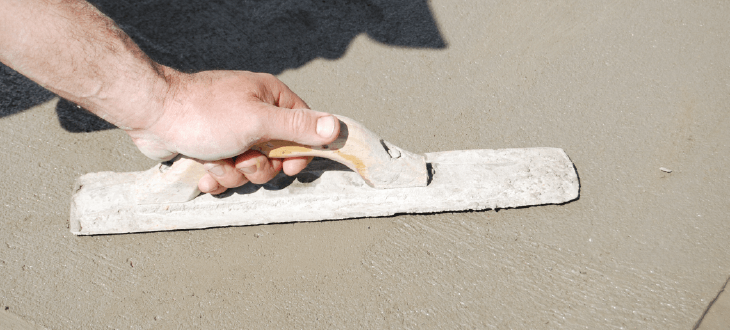
Installing a concrete imprint driveway is an efficient and versatile process significantly enhancing a property's curb appeal and functionality.
Below is a step-by-step guide on installing imprinted concrete driveways so you can understand the process and its time.
- The site has to be excavated to a depth of 150mm to 200mm. A mini-digger removes old driveways and front gardens and digs to the correct depth.
- After the site is excavated, a sub-base is added to create a stable base and allow weight to be evenly distributed.
- Edge restraints are added and used as a decorative feature to hold the material in shape.
- After that, a driveway drainage system is installed. Imprinted concrete is not porous and requires a drainage system to prevent flooding and water runoff.
- Once all additional features are added, the concrete is poured onto the surface and levelled to create a flat surface.
- The pattern is then imprinted on the wet concrete using a rubber stamp.
- After the concrete has been imprinted, a protective sealant is applied to enhance the surface's durability and resistance to stains, weathering, and wear and left to cure.
The result is a durable, low-maintenance driveway that beautifully replicates the look of more expensive paving materials, providing a cost-effective yet stylish solution.
However, it's important to note that a professional should only install imprinted concrete driveways. Having experienced professionals install an imprinted concrete driveway ensures a high-quality finish that stands the test of time.
This helps avoid costly errors, ensures compliance with safety and building standards, and ultimately provides a durable and aesthetically pleasing driveway that enhances the property's value.
We can help you find the best local driveway specialists tailored to your needs for your new imprinted concrete driveway. By filling out our 30-second form, we can offer four free non-binding quotes from trusted local installers. Click below to find out more.
- Describe your needs
- Get free quotes
- Choose the best offer
It only takes 30 seconds

Cleaning an imprint concrete driveway
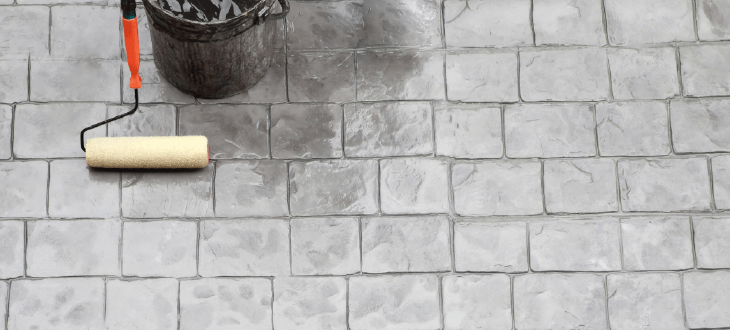
It is easier to clean an imprinted concrete driveway compared to other surfaces. This is due to its durability and non-porous nature. Additionally, because it only has the appearance of grooves, it remains a relatively flat surface, making it easier to maintain.
To ensure the longevity of your imprinted driveway, it's essential to clean it at least once a week. This requires using a light brush to remove debris, such as leaves and dirt.
For light dust and dirt stains, a simple rinse with water can effectively clean the driveway. This helps wash away surface contaminants without the need for harsh chemicals.
For tougher stains or grime, mix a mild detergent with water and apply it using a mop or soft-bristle brush. Scrub gently to avoid damaging the sealant or the imprinted pattern.
Occasionally, it is advisable to use a pressure washer to clean more deeply. Set it to a low to medium pressure to avoid damaging the concrete surface or lifting the sealant. Sealant protects your driveway from damage, stains, scratches and UV damage.
Driveway maintenance: how to use imprinted concrete sealer
Applying an imprinted concrete sealer is a simple process that significantly improves the durability and appearance of your concrete surface.
Begin by thoroughly cleaning the driveway to remove any dirt, debris, or stains, ensuring a smooth and even application. It's crucial to allow the concrete to dry completely before applying the sealer to prevent trapping moisture, which can lead to bubbling or hazing.
Consider your specific needs and preferences when selecting a sealer for your driveway. High-gloss sealers provide a shiny finish that offers protection against stains and UV rays.
Matte sealers, on the other hand, offer a non-reflective finish, providing moderate protection against stains and making scratches less visible.
Penetrating sealers do not change the appearance of your driveway but provide excellent protection against moisture, freeze-thaw damage, efflorescence, and UV rays.
After you have selected a sealer, use a roller or sprayer to apply the sealer in thin, even layers, starting from one end and working methodically to the other to ensure complete coverage.
Avoid over-application, as too much sealer can create a slippery surface and cause the sealer to peel or become cloudy. After applying the first coat, allow it to dry for the recommended time, usually around 24 hours, before applying a second coat if necessary.
This layered approach helps achieve a more durable and long-lasting finish. After you have applied the final coat, leave it for 48 hours so that it can properly cure.
Regular maintenance and reapplication every 2-5 years will help maintain the protective barrier and keep the imprinted concrete looking vibrant and resistant to stains and wear.
Repairing and resurfacing imprinted driveways
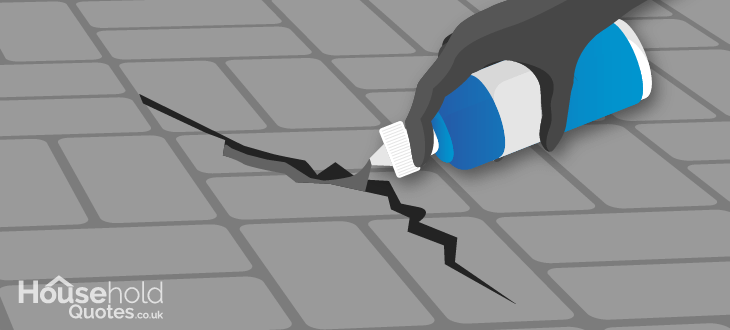
If you don't maintain a patterned concrete driveway, it can develop cracks, potholes, and chips. These issues can cause harm to your vehicles and become tripping hazards for those using the driveway.
To resolve these issues, you can take a few steps. For minor cracks and chips, you can use a concrete patching compound with a palette knife. Once it begins to dry, remove the excess patching compound. After filling it, leave it for 24 hours before reapplying sealant.
Resurfacing is often necessary for more extensive damage or wear. This involves cleaning the driveway to remove dirt, debris, and loose concrete, followed by the application of a bonding agent to promote adhesion. Apply a new layer of concrete or a specialized resurfacing compound to the existing surface.
Apply a new layer with the original or new pattern. Reapply colour to match or refresh the existing look, then seal for durability and weather resistance.
This process repairs any damage and revitalises the driveway’s appearance, making it look as good as new while extending its lifespan and maintaining the property’s curb appeal.
Regular maintenance and timely repairs are essential to keep imprinted concrete driveways in optimal condition and prevent minor issues from escalating into more significant problems.
Pattern imprinted concrete driveways: pros and cons
Pattern-imprinted concrete driveways offer a balance of beauty and practicality, making them an excellent choice for many homeowners. However, like any material, they have advantages and disadvantages.
- Durability: Imprinted concrete is highly durable and can withstand heavy loads and harsh weather conditions, making it a long-term investment for homeowners. Furthermore, sealing the surface makes it resistant to fading and stains.
- Low maintenance: The non-porous surface of imprinted concrete makes it easy to clean. Routine maintenance typically involves sweeping and occasional washing with a garden hose or pressure washer.
- No weeds: Unlike traditional pavers, imprinted concrete driveways do not have joints where weeds can grow or sections that can shift, reducing the need for frequent upkeep.
- Cost-effective: Compared to natural stone or high-end pavers, imprinted concrete can be more cost-effective to install while providing a high-end look.
- Longevity: The durability and low maintenance requirements contribute to lower long-term costs than other driveway materials.
- Customisable design: You can choose from various patterns and colours to achieve a look that complements their property and personal style.
- Susceptible to cracks: Like all concrete surfaces, imprinted concrete is susceptible to cracking over time due to ground movement or freeze-thaw cycles. These cracks can be challenging to repair without visible patches.
- Surface slipperiness: The sealed surface can become slippery, especially when wet, which may pose a hazard in certain conditions. Adding a non-slip additive to the sealer can mitigate this risk.
- Difficult to repair: If significant damage occurs, such as deep cracks or extensive surface wear, repairing imprinted concrete can be complex and may require professional intervention to restore the original pattern and colour.
- Limited flexibility: Unlike pavers or bricks, imprinted concrete does not accommodate ground movement well. Shifting soils or settling can lead to uneven surfaces and cracking.
- Temperature sensitivity: Concrete absorbs and retains heat, making it uncomfortable for the surface to walk barefoot during hot weather. In colder climates, freeze-thaw cycles can cause the concrete to expand and contract, increasing the risk of cracking.
- Colour fading: Without proper sealing and maintenance, the colours can fade over time due to exposure to UV rays, diminishing the visual appeal.
Understanding the pros and cons of imprinted concrete driveways and proper installation and maintenance is essential to ensuring that this investment delivers the desired benefits over time.
- Describe your needs
- Get free quotes
- Choose the best offer
It only takes 30 seconds

FAQ
Imprinted concrete driveways are good as they are a cost-effective alternative to high-end materials like cobblestones or block pavers. They offer a combination of aesthetic appeal, durability, and low maintenance.
Imprinted concrete is not cheaper than other paving options, such as asphalt, flat-poured concrete, or gravel. This is because of the additional labour in imprinting the design into the concrete. However, it is a more affordable alternative to driveway materials like block pavers.
An imprinted concrete driveway can last between 20 to 30 years with proper maintenance. Failure to maintain it properly can lead to cracks, chips, and potholes, necessitating repairs or resurfacing.
Stamped concrete has several disadvantages. These include susceptibility to cracking due to ground movement or temperature changes, potential wet slipperiness and potential colour fading from UV exposure. Additionally, it lacks the flexibility to adapt to ground shifts. It can retain heat, making it uncomfortable to walk on in hot weather.

Caoimhe is an experienced content writer and researcher who is passionate about providing accessible information to every reader. With a background in English literature and Sociology, she combines the two disciplines to create cohesive, well-thought-out, and well-informed pieces.
